Kansas Republicans want to ban transgender youths from getting gender-affirming care
Kansas Republican legislators were successful last year at enacting several pieces of anti-transgender legislation over the vetoes of Democratic Gov. Laura Kelly.
Now, the GOP has renewed the push for the one bill they couldn't get enacted last session: a ban on gender-affirming care for transgender youth.
Supporters of banning gender-affirming care say they are protecting children from abuse, but LGBTQ rights advocates say such a ban would worsen the higher suicide rates among trans people.
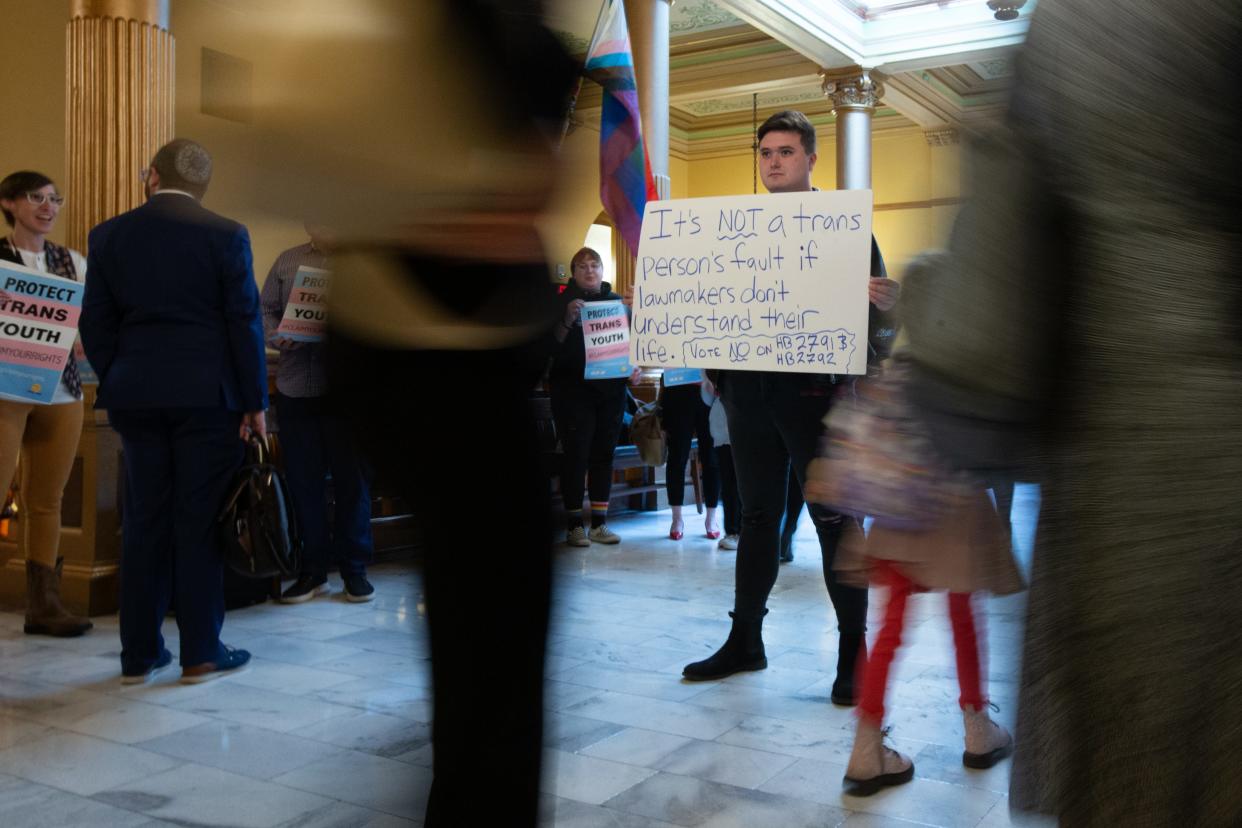
What bills are Kansas lawmakers considering?
Health committees in the House and Senate on Thursday held hearings on legislation targeting gender-affirming care for youths.
House Bill 2791 would ban health care professionals from providing gender-affirming care, including surgery and puberty blockers, to children. Those professionals would need parental consent to discuss social transitioning or treatment. There would also be a ban on state money being used for such care, as well as related actions by state employees, such as child welfare social workers.
Health care professionals could be sued for violations, and they would be banned from having liability insurance to cover such lawsuits.
It was introduced by Rep. Ron Bryce, R-Coffeyville.
House Bill 2792 would ban physicians from providing "gender transition surgery" to youths. Doing so would legally be considered a form of professional incompetence. It would also impose a single care guideline on medical providers for adult transgender patients.
It was introduced by Rep. Brenda Landwehr, R-Wichita and chair of the House Health and Human Services Committee.
House GOP leadership "blessed" both bills to make them exempt from the Feb. 23 turnaround deadline.
What do bill supporters say?
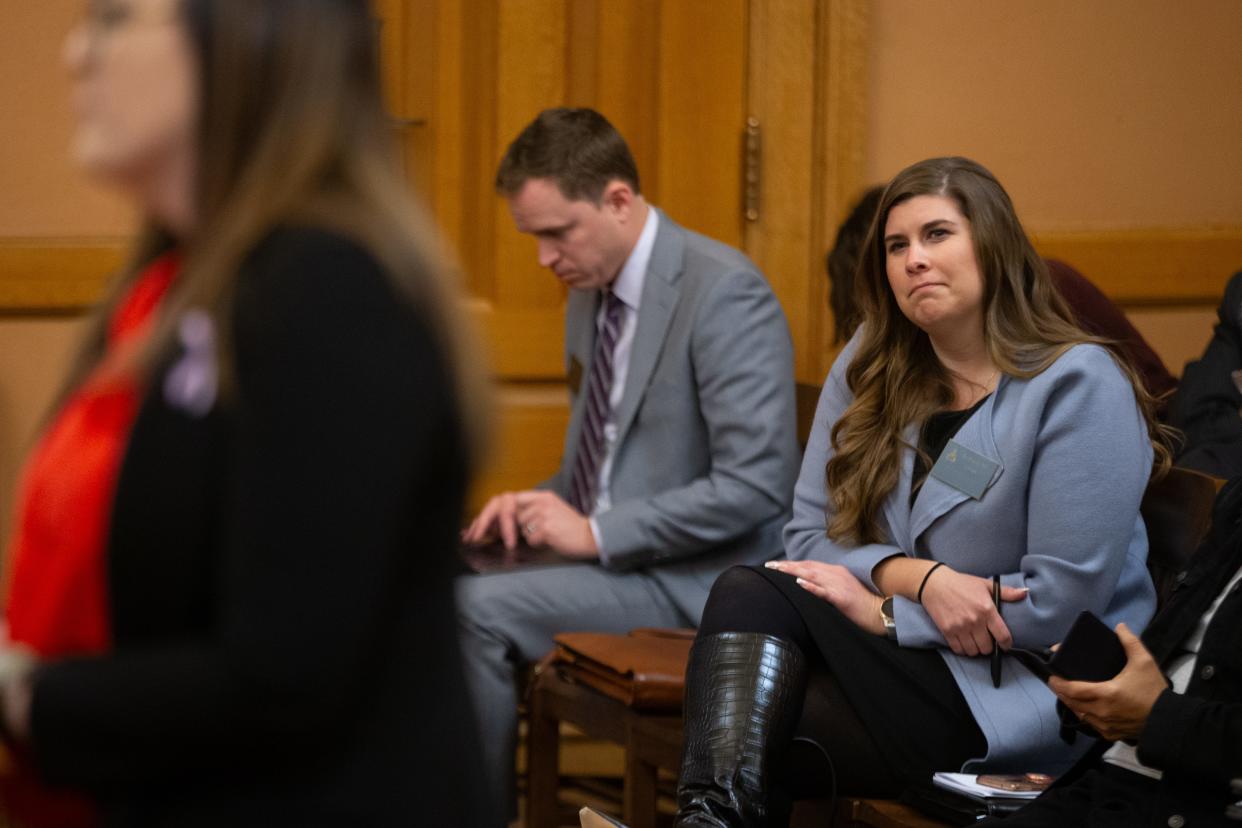
"Transgender treatments manipulate or destroy tissue or flesh in otherwise healthy bodies to treat mental problems," Bryce said.
Brittany Jones, of Kansas Family Voice, said HB 2791 "ensures that Kansas children will be given time to pursue proper therapies to deal with underlying issues" and holds other people "accountable."
Most of the proponents who testified in-person were from other states.
That included Chloe Cole, a 19-year-old from California who started to transition but stopped the process and "detransitioned." She now speaks across the countryon the topic.
"I fell victim to gender ideology," Cole said. "This ideology targets kids like me who are different, or are on the autistic spectrum, or struggling with puberty, trauma and forming their identity as they grow into adults. We need to stop the medical industry from taking advantage of these kids, the same way that I have been and now thousands of other children have been."
She called it "abuse."
Joseph Kolm, of the Colorado-based Family Policy Alliance, said the bill will "disincentivize predatory behavior" toward children.
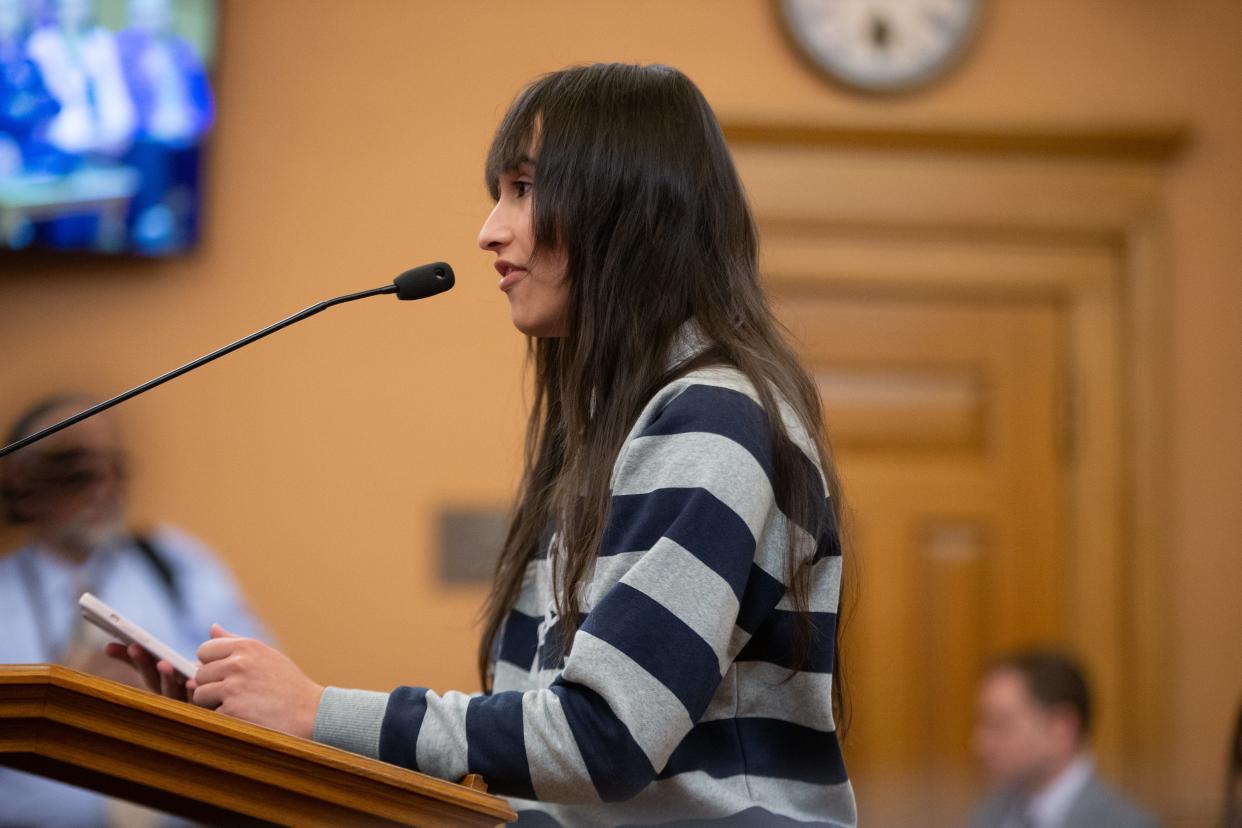
Jamie Reed, of Missouri, was another supporter of the bill. She previously worked as a case manager for the Washington University transgender center at St. Louis Children's Hospital before making whistleblower allegations. Families disputed those allegations, and the hospital's internal investigation determined they were unsubstantiated.
Missouri lawmakers then banned gender-affirming care for youths.
"Children and adolescents right now have no one else to turn to except for state legislatures," Reed said.
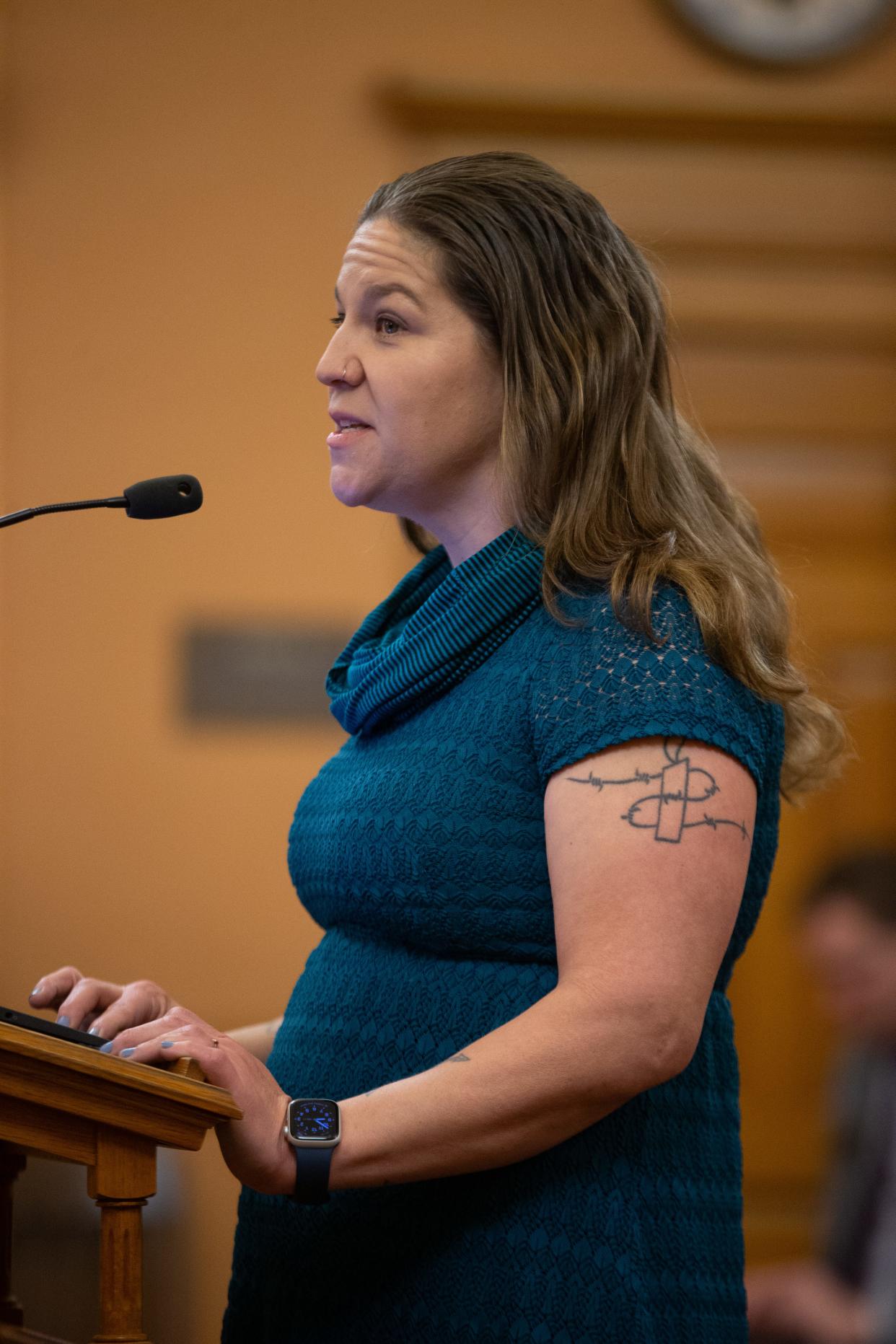
Opponents of gender-affirming care were dismissive of the suggestion that denying such care could lead to suicides among trans youths.
Pamela Garfield-Jaeger, a California social worker and a supporter of the bill, described the talk of suicide as "blackmail" and a "myth." Reed called suicide a "social contagion."
"The way that this is being discussed in general, in this room, across the media, across this entire medical industry is going against every single good known practice about how to decrease social contagions," Reed said. "I saw doctors directly tell patients that it was either medically transition your child or you would have a dead child. That is absolutely not how medicine should be practiced."
Bryce said transgender medical treatments aren't safe or effective, and "they do not reduce suicide risk in gender dysphoric children."
According to PolitiFact, "Numerous studies have found a link between access to gender-affirming care and improved mental health for young people experiencing gender dysphoria."
What do LGBTQ rights advocates say?
"When our identities are put up for debate, it strips us of our humanity," said Iridescent Riffel, co-chair of the Equality Kansas chapter in Douglas County.
Riffel spoke of violence against transgender people and told senators that "their blood is on your hands" if they vote in favor of the legislation.
When she made similar comments in the House committee, she was kicked out. Likewise, Jaelynn Abegg, a transgender woman from Wichita, was gaveled down by Landwehr.
"It it becomes law, there will be consequences, and as those consequences manifest as children begin to die around us, it sickens me that most of the Legislature will be patting themselves on the back with their bloodied red hands," Abegg said.
"Jaelynn, I said no disparaging to the committee members or the Legislature, so you can cease right now," Landwehr said. "Please sit down."
The Rev. Caroline Dean, of Plymouth Congregational UCC Church in Lawrence and Kansas Interfaith Action, pointed to higher suicide attempt rates among transgender people.
"Gender-affirming care is life-saving care," Dean said. "Imagine the government banning care that could help save your child's life."
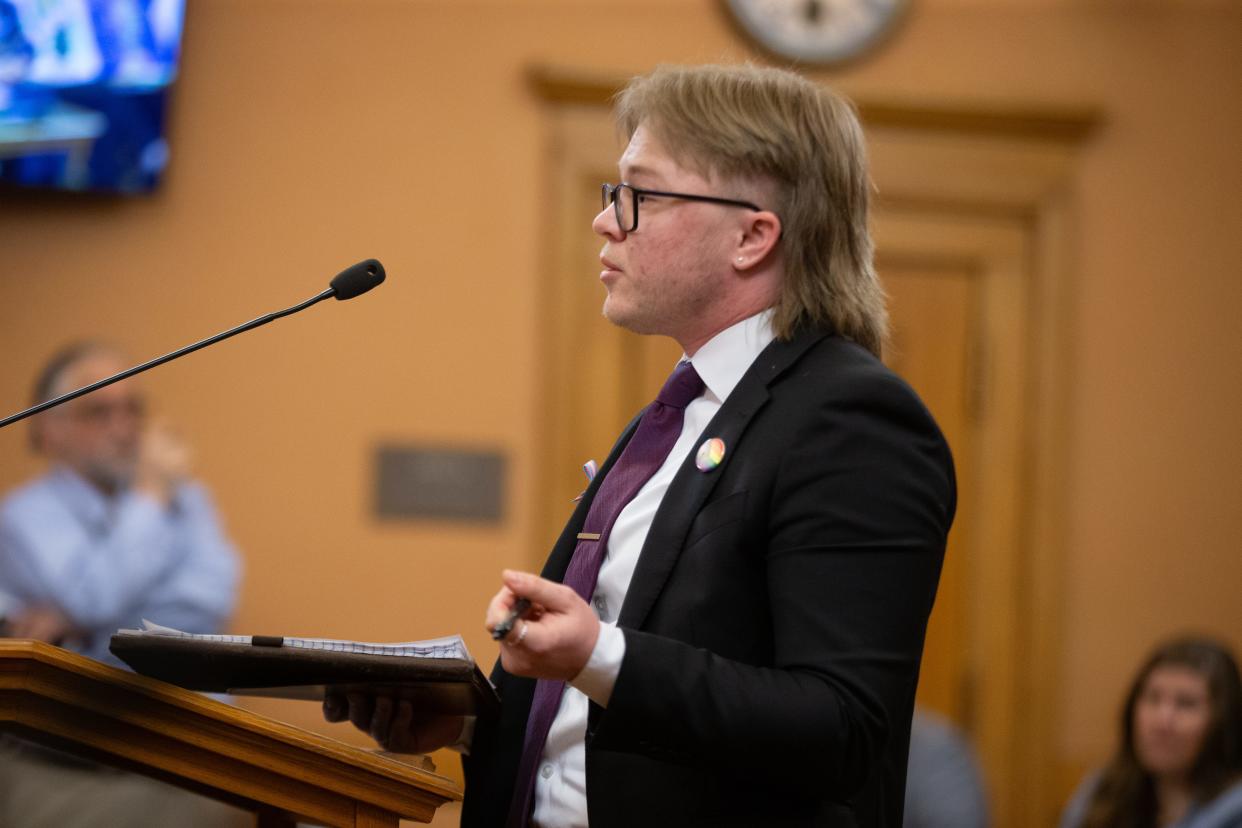
D.C. Hiegert, an attorney at the ACLU of Kansas, said the bill violates the constitutional rights of children, parents, therapists, doctors and teachers.
"This bill would set a precedent that Kansas medical providers should not give you the nationally recommended best medical care available, but instead give you the medical care that politicians decide you should have access to," Hiegert said. "This bill forces the government into health care decisions that should be between a provider, the patient and the patient's family."
They said the bill violates the Kansas constitutional right to personal autonomy while taking away parental rights to make decisions about their child's health care.
"Please, listen to the Kansans here today," Hiegert said. "Kansans have shown you we do not want this bill because we know it will cause serious harm, and I do not mean that in an abstract sense. People will die. Families will suffer. The practice of medicine will be compromised, not just for trans people but for everyone in Kansas."
Hiegert, who is transgender, said, "The very care this bill attacks is the reason I am alive and able to advocate for my fellow Kansans' rights."
Hiegert said many transgender residents of Kansas love the state, "but bills like these tell us our state does not love us back."
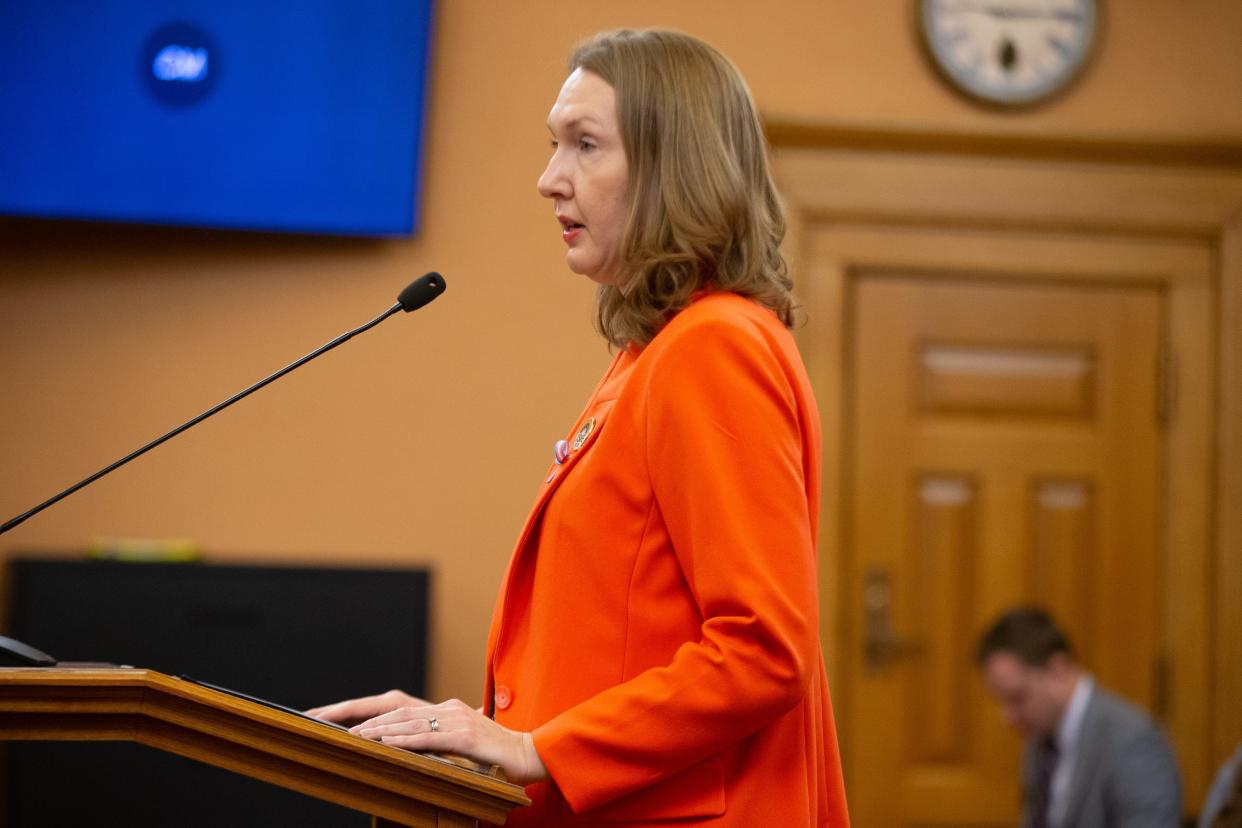
Cat Poland, of Hutchinson, is the mother of a transgender son. Some people have told her they consider gender-affirming care to be child abuse.
"HB 2791 is called the 'Forbidding Abusive Child Transitions Act,' and that breaks my heart," Poland said.
She said her son's response to the bill title is, "It would have been abuse not to help me."
Poland said her son attempted suicide, and a top concern for her is, "I am worried about him being alive today and surviving to adulthood." She said that gender-affirming care has worked, as her son's health is improving, as are his grades in school.
Amanda Mogoi is a nurse practitioner in Wichita and is certified by the World Professional Association for Transgender Health, or WPATH.
"No youth are moving forward with gender-affirming care without the support and legal informed consent of all of their legal guardians," Mogoi said. "No youth are making these decisions on their own. No youth are being targeted by these organizations that support trans care."
She offered to work with legislators to develop safe standards of care, "but totally outlawing care is just not the way to go."
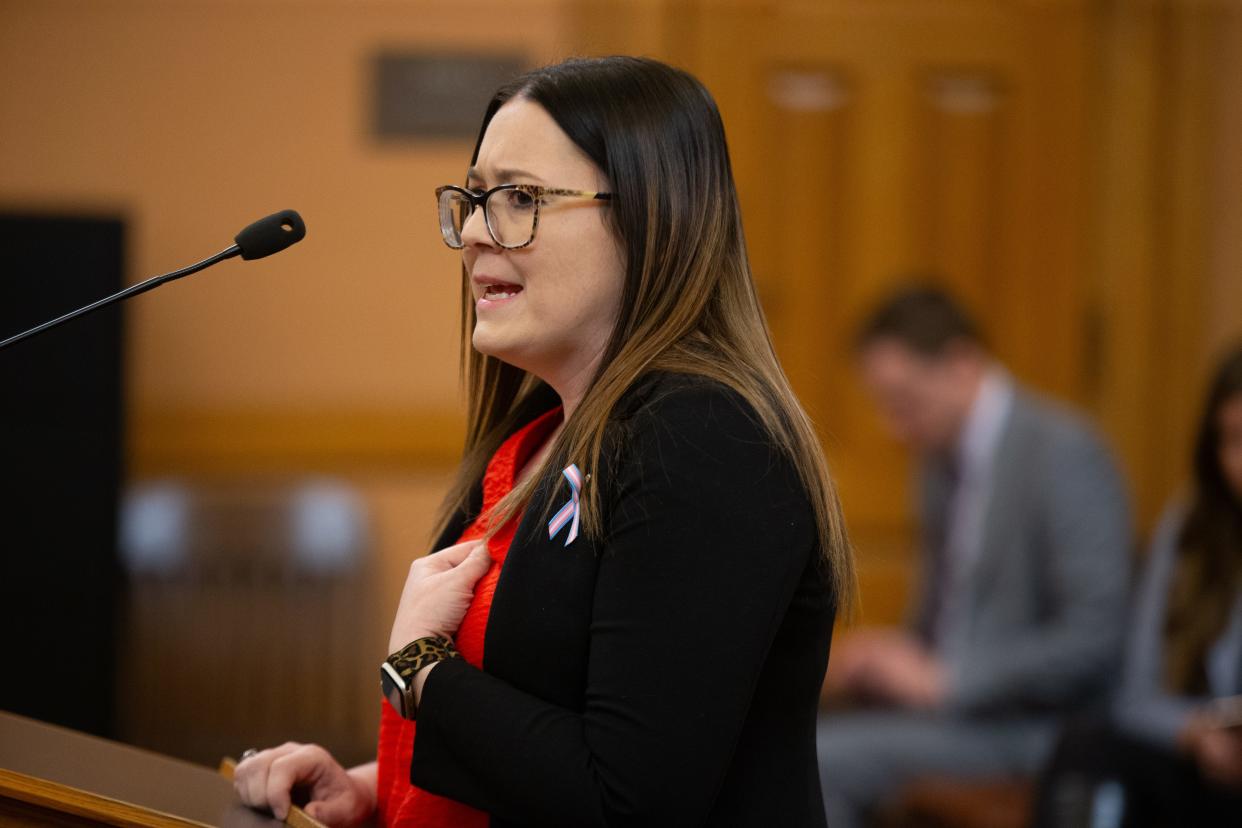
Mogoi said nurses are supposed to do no harm, but told legislators, "That's what you're doing here today, we're causing harm." She said what transgender kids hear is "that they aren't worthy to be here."
"The Kansas Legislature doesn't care enough about these kids and their families to trust them to make decisions for their own medical care," she said. "I ask you to stop that."
Sen. Mark Steffen, R-Hutchinson, took offense to that.
"Help me understand who's articulating to these minors that they aren't worthy, because I'll guarantee you it's certainly not me and it's not anybody on the other side of the issue saying that," Steffen said. "We're saying we're here because we care about the children. Are you telling kids they're not worthy? Do you talk about suicide to the kids?"
"Dr. Steffen," Mogoi replied, "can I ask you who told you when you woke up this morning that you were a male gendered person?"
"I'm sorry, just answer the question, please," said Sen. Beverly Gossage, R-Eudora and chair of the Senate Public Health and Welfare Committee.
"OK, well my answer would be that this committee and the Legislature over and over tells children that they are not valuable and not worthy to make their own health care decisions and to say who they are and to be believed," Mogoi said.
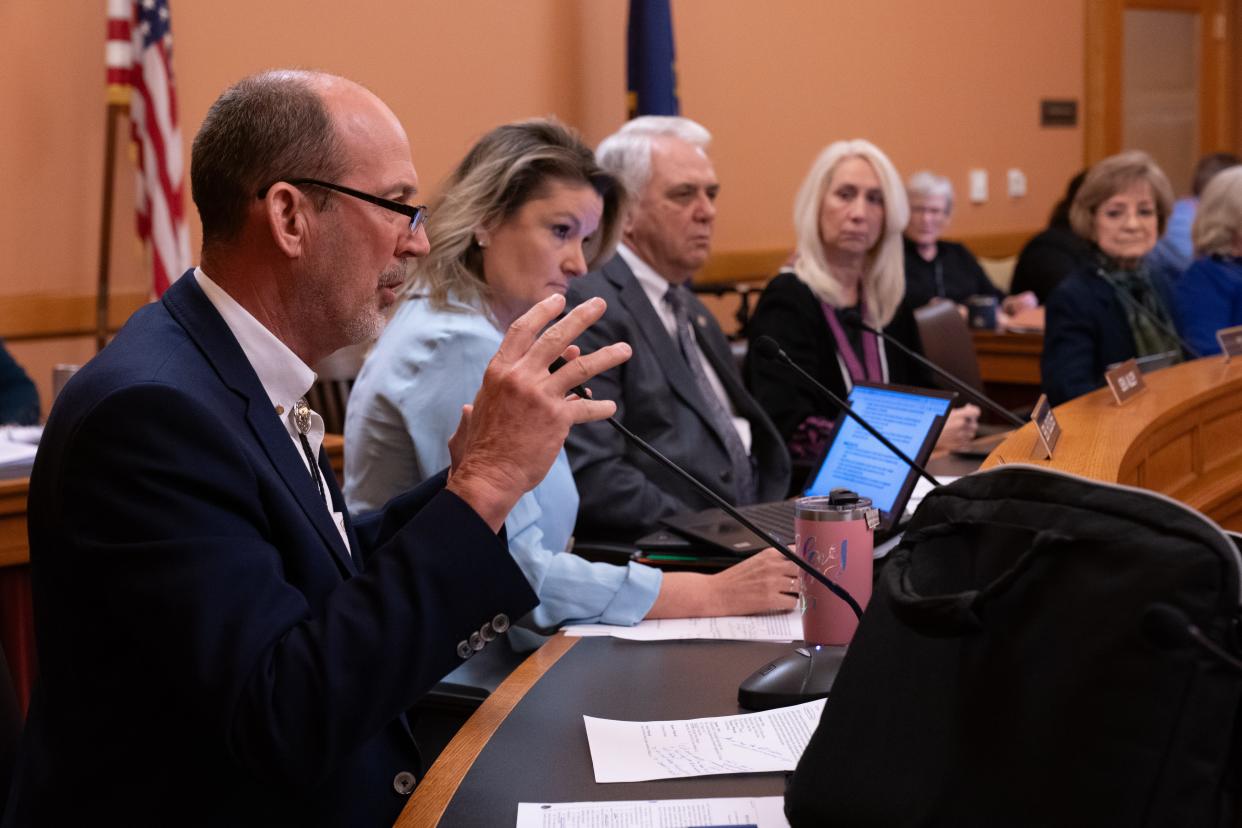
Republicans in Kansas and U.S. have pushed bills targeting trans people
After Republican lawmakers had trouble overriding vetoes by the Democratic governor in 2021 and 2022, anti-transgender politics was a major GOP campaign theme during Derek Schmidt's failed gubernatorial campaign in 2022. Political figure and former University of Kentucky swimmer Riley Gaines appeared in an ad for Schmidt, and drag shows also faced Republican ire.
While Schmidt lost, the GOP supermajorities got more conservative, and they pushed through several bills in the 2023 session targeting transgender people by successfully overriding Kelly's vetoes.
The most notable were Senate Bill 180, which has resulted in transgender people being denied driver's licenses with gender markers matching their gender identities, and House Bill 2238, which bans transgender girls and women from competing in sports against girls and women.
More: 'Today is the start of hate week' — Advocates decry flood of anti-transgender bills in Kansas
With SB 180 last year, Kansas among the first states to enact a law strictly defining sex based on anatomy at birth, which supporters described as a "women's bill of rights." Other states passed similar laws last year, and now at least 13 more states have similar proposals this year, the Associated Press reported.
Meanwhile, at least 23 states have banned gender-affirming care for minors, and Kansas is looking to join those states this year. Some of those states have started pushing bans on gender-affirming care for adults after they succeeded in prohibiting it for children.
SB 180 quickly became the subject of a lawsuit by Attorney General Kris Kobach to block the Kelly administration from allowing gender marker changes on driver's licenses, as had been done at the Kansas Department of Revenue for about a decade. Kobach secured a temporary restraining order from Shawnee County District Court Judge Teresa Watson.
Watson held oral arguments on a proposed temporary injunction in January but has yet to issue a ruling.
More: Will transgender Kansans be able to change gender markers? Kris Kobach and ACLU square off
The first known violation of the new trans athlete ban happened in August, when the women's volleyball team at the private Ottawa University had a transgender athlete on the roster for a junior varsity match against a public community college.
But Republicans in 2023 were unable to enact Senate Bill 26, which was last year's bill targeting gender-affirming care. It would have allowed lawsuits against physicians who perform such surgeries or prescribe puberty blockers while also revoking their medical licenses.
Senate Republicans were one vote short of overriding a veto, so the House — which was projected to be a dozen votes shy of a supermajority — never took up the override.
Jason Alatidd is a Statehouse reporter for the Topeka Capital-Journal. He can be reached by email at jalatidd@gannett.com. Follow him on X @Jason_Alatidd.
This article originally appeared on Topeka Capital-Journal: Kansas Republicans want to ban gender-affirming care for trans youths
